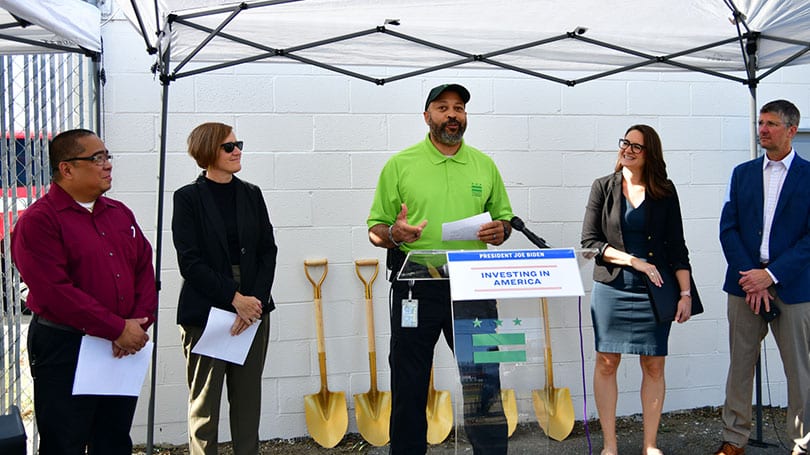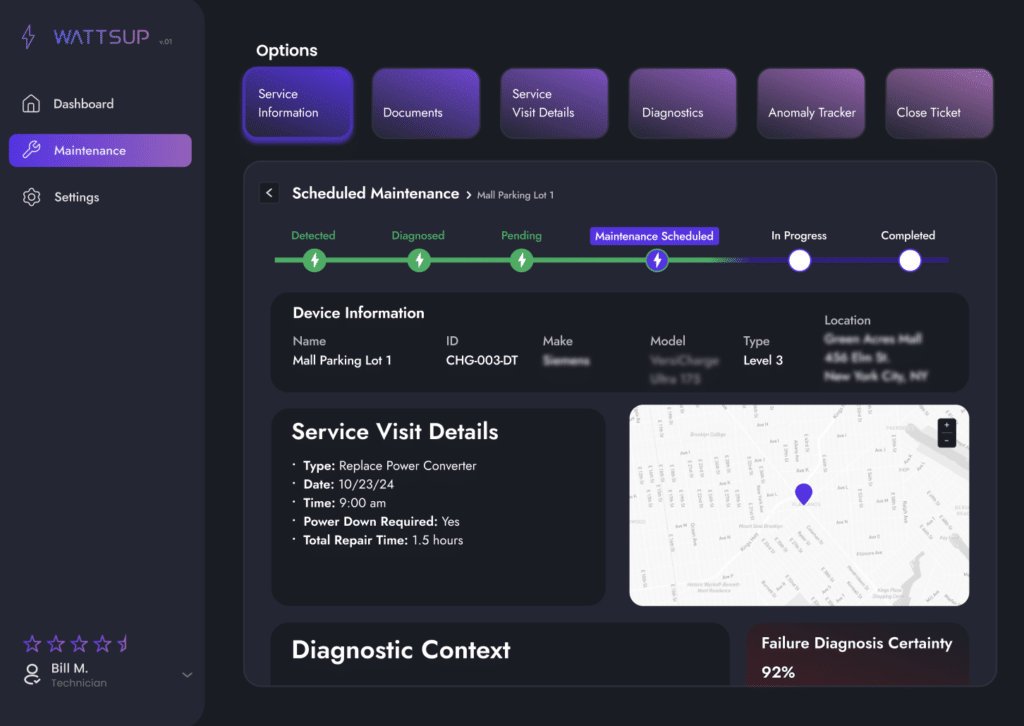Federal EVC-RAA Program and WattsUp Addressing the EV Charging Reliability Problem
In 2024, reliability issues with electric vehicle (EV) charging stations continue to pose a significant challenge to EV adoption in America. Compared to traditional gas pumps, charging stations are notably less reliable. A study from Harvard Business School highlighted that U.S. EV charging stations have an average reliability score of 78%. Furthermore, many EV network providers overstate their reported uptime. While they often claim an uptime of 84.6%, a ChargerHelp analysis found that the actual uptime is closer to 73.7%. This gap in reported versus real performance reflects challenges in the consistency of EV charging services.
For drivers, these issues are more than theoretical; a recent Plug In America survey showed that 68% of U.S. EV drivers had encountered broken or nonfunctional chargers within the last year, contributing to mounting frustration. Out-of-service stations have become a frequent and aggravating issue for drivers, complicating their charging experience and discouraging those who are considering moving from internal combustion engine (ICE) vehicles to EVs.
Experts point out that the widespread involvement of multiple companies in the EV charging ecosystem may contribute to these problems. Some believe that achieving high reliability in EV charging is possible but will require substantial organizational alignment and adequate funding to ensure a seamless and dependable infrastructure for EV users.
The Federal EVC-RAA Grant Program Addresses EV Charging Reliability
Round 1A of the Electric Vehicles Charger Reliability and Accessibility Accelerator (EVC-RAA) funding was announced on October 24, 2024, with the proposal submission period open from November 11, 2024, to January 10, 2025. Eligible locations identified by the Federal Highway Administration (FHWA) that don’t meet federal reliability requirements can apply for funding to repair, upgrade, or replace equipment to align with FHWA standards. These standards include a minimum of four charging ports and a 97% uptime requirement. With $4.7 million still available for future rounds, the EVC-RAA program aims to ensure reliable and accessible EV charging.
The Biden-Harris Administration set ambitious goals for a convenient, affordable, reliable, equitable, and domestically produced electric vehicle (EV) charging network across highways and within communities nationwide. Supporting this vision, the Infrastructure Investment and Jobs Act—also known as the Bipartisan Infrastructure Law (BIL)—established the National Electric Vehicle Infrastructure (NEVI) Formula Program as the first major federal initiative focused on deploying a nationwide EV charging infrastructure.
To address gaps in EV infrastructure and improve reliability, the NEVI Formula Program designates ten percent of its funds to provide grants to states and localities needing extra assistance to strategically install EV chargers, through the Electric Vehicles Charger Reliability and Accessibility Accelerator (EVC-RAA) program. This set-aside funding specifically targets the repair or replacement of non-operational EV chargers, directly addressing the need for a dependable charging network.
In August, the Joint Office announced that the federally-funded EVC-RAA grant program has made nearly $150 million available for American communities to repair roughly 4,500 existing EV charging ports.
A EVC-RAA-funded electric vehicle (EV) charging project “re-groundbreaking” in Washington, D.C. was announced in August. The currently inoperable station will receive upgraded EV charging infrastructure, featuring expanded charging capacity at faster speeds.

PennDOT Announces Round 1A of Electric Vehicle Charger Reliability Program
On October 26, 2024, The Pennsylvania Department of Transportation (PennDOT) announced the launch of the first round of its Electric Vehicles Charger Reliability and Accessibility Accelerator (EVC-RAA) program. This initial round, designated as Round 1A, focuses on repairing and replacing non-functional chargers to improve the dependability of Pennsylvania’s EV infrastructure.
In this phase, PennDOT awarded $300,000 to projects from Electrify America and Leg Up Farmers Market. Electrify America will use the funds to upgrade chargers in Willow Grove, introducing new Gen 4 DC Fast Charge units. Leg Up Farmers Market in York, PA, will replace existing chargers with new Level 2 units to increase uptime and reliability.

WattsUp is Enhancing the Reliability and Efficiency of EV Charging Infrastructure
WattsUp’s mission is to accelerate the adoption of electric vehicles by improving the reliability and efficiency of EV charging infrastructure through cutting-edge technology and innovative solutions. The company strives to lead the industry with its AI-driven predictive maintenance systems, which ensure seamless operation and exceptional user experiences. By doing so, WattsUp aims to foster confidence and convenience for EV users around the world, making electric vehicle adoption a more accessible and attractive choice.
Machine Learning Reliability for Connected EV Chargers
At the heart of WattsUp’s services is their powerful AI technology, designed to enhance the reliability and efficiency of EV charging infrastructure. They utilize advanced machine learning algorithms to analyze data from both OCPP-compliant and legacy chargers, offering accurate predictions and valuable insights into charger performance.
WattsUp’s real-time monitoring system continually observes EV chargers, delivering instant insights and alerts for any anomalies or performance issues. This proactive approach helps prevent downtime, ensuring that charging infrastructure operates continuously and efficiently.
The company further streamlines the maintenance process through automated repair scheduling. By analyzing data from their monitoring and predictive maintenance tools, WattsUp autonomously schedules repairs and dispatches technicians at the most convenient times.
WattsUp up then empowers the technician with the data and prescriptive diagnostics needed to ensure on-site success and high first-time-fix rates. By making technicians more efficient, WattsUp minimizes operational disruptions and cost for the site operator, allowing them to focus on their core activities while knowing that maintenance is seamlessly managed without requiring their intervention.
This minimizes disruptions to operations, allowing charge site operators to focus on their core activities while knowing that maintenance is seamlessly managed without requiring their intervention.

WattsUp’s comprehensive data analytics service provides detailed reports and insights into the performance of EV chargers. These analytics empower clients to make informed decisions, optimize operations, and enhance overall charging reliability.
WattsUp Joins the ChargeX Consortium
Recently, WattsUp announced its membership in the National Charging Experience Consortium (ChargeX Consortium), representing a major milestone in its mission to transform electric vehicle (EV) charging. This achievement is not only a testament to WattsUp’s commitment but also a meaningful advancement for the broader EV industry. By partnering with other passionate leaders, WattsUp aims to drive forward the development of innovative EV charging standards and infrastructure, fostering a more sustainable future for electric mobility.
The ChargeX Consortium is an innovative collaboration of industry leaders and stakeholders dedicated to advancing electric vehicle (EV) charging standards and infrastructure. Formed to address the growing demand for efficient and reliable charging solutions, the consortium brings together experts from various sectors, including automotive manufacturers, technology providers, utility companies, and infrastructure developers.
Key Objectives of the ChargeX Consortium
The Joint Office of Energy and Transportation (Joint Office) has provided funding for a team comprising three national laboratories to spearhead the ChargeX Consortium. This initiative involves collaboration between Argonne National Laboratory, Idaho National Laboratory, and the National Renewable Energy Laboratory, which will work together with various organizations representing a diverse cross-section of the electric vehicle (EV) industry.
The ChargeX Consortium is focused on addressing three critical challenges in the EV charging landscape:
Payment Processing and User Interface: The consortium aims to enhance the payment systems and user interfaces associated with EV charging. By improving the ease and efficiency of transactions, they seek to create a more seamless experience for EV users.
Vehicle-Charger Communication: Another key area of focus is improving communication between vehicles and chargers. This involves developing standards and technologies that allow for better interaction between electric vehicles and charging infrastructure, facilitating more efficient charging processes.
Diagnostic Data Sharing: The consortium will also tackle the challenge of sharing diagnostic data among stakeholders. By enabling better access to and sharing of diagnostic information, the ChargeX Consortium aims to enhance maintenance and operational efficiency across the charging network.
Through these collaborative efforts, the ChargeX Consortium strives to create a more reliable, user-friendly, and efficient EV charging experience, ultimately supporting the broader adoption of electric vehicles.
EVinfo.net is a proud member of the ChargeX Consortium, and highly recommends WattsUp.

Electric Vehicle Marketing Consultant, Writer and Editor. Publisher EVinfo.net.
Services